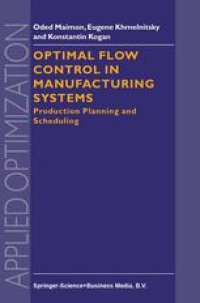
Ebook: Optimal Flow Control in Manufacturing Systems: Production Planning and Scheduling
- Tags: Manufacturing Machines Tools, Production/Logistics/Supply Chain Management, Electrical Engineering, Systems Theory Control, Mechanical Engineering
- Series: Applied Optimization 18
- Year: 1998
- Publisher: Springer US
- Edition: 1
- Language: English
- pdf
This book presents a unified optimal control approach to a large class of problems arising in the field of production planning and scheduling. It introduces a leading optimal flow control paradigm which results in efficient solutions for planning and scheduling problems. This book also introduces the reader to analytical and numerical methods of the maximum principle, used here as a mathematical instrument in modeling and solving production planning and scheduling problems. The book examines control of production flows rather than sequencing of distinct jobs. Methodologically, this paradigm allows us to progress from initial assumptions about a manufacturing environment, through mathematical models and construction of numerical methods, up to practical applications which prove the relevance of the theory developed here to the real world. Given a manufacturing system, the goal is to control the production, subject to given constraints, in such a way that the demands are tracked as closely as possible. The book considers a wide variety of problems encountered in actual production planning and scheduling. Among the problems are production flow sequencing and timing, capacity expansion and deterioration, subcontracting and overtime. The last chapter is entirely devoted to applications of the theory to scheduling production flows in real-life manufacturing systems. The enclosed disk provides software implementations of the developed methods with easy, convenient user interface. We aimed this book at a student audience - final year undergraduates as weIl as master and Ph. D.
The book presents a new paradigm for modeling and solving production planning and scheduling problems in industry. Methodologically, this paradigm forms the basis for developing a sound scientific theory based on optimal control and the maximum principle. The book progresses from initial assumptions about a manufacturing environment, through mathematical models and construction of numerical methods, up to practical solutions. The case studies prove the relevance and efficiency of the theory to the real world. Software based on the developed methods is included. This is the only book which traces strong theoretical results of the scheduling theory into real case studies of large leading manufacturing systems.
Audience: Primarily students in Industrial Engineering and Management Science but also Electrical/Mechanical Engineering students interested in control. It is also a useful reference.
The book presents a new paradigm for modeling and solving production planning and scheduling problems in industry. Methodologically, this paradigm forms the basis for developing a sound scientific theory based on optimal control and the maximum principle. The book progresses from initial assumptions about a manufacturing environment, through mathematical models and construction of numerical methods, up to practical solutions. The case studies prove the relevance and efficiency of the theory to the real world. Software based on the developed methods is included. This is the only book which traces strong theoretical results of the scheduling theory into real case studies of large leading manufacturing systems.
Audience: Primarily students in Industrial Engineering and Management Science but also Electrical/Mechanical Engineering students interested in control. It is also a useful reference.
Content:
Front Matter....Pages i-xv
Front Matter....Pages 1-1
Introduction....Pages 3-9
Mathematical Fundamentals of Optimal Control....Pages 11-55
Front Matter....Pages 57-57
One-Item Single-Facility Aggregate Production Planning Problems....Pages 59-84
Production Planning At Different Levels Of Aggregation....Pages 85-116
Front Matter....Pages 117-117
Modeling Production Systems With Multi-Level Bills Of Materials....Pages 119-137
Necessary Optimality Conditions for Scheduling Problems....Pages 139-206
Solution Methods....Pages 207-267
Front Matter....Pages 269-269
Implementation Methodology....Pages 271-286
Cases of Practical Scheduling....Pages 287-344
Back Matter....Pages 345-348
The book presents a new paradigm for modeling and solving production planning and scheduling problems in industry. Methodologically, this paradigm forms the basis for developing a sound scientific theory based on optimal control and the maximum principle. The book progresses from initial assumptions about a manufacturing environment, through mathematical models and construction of numerical methods, up to practical solutions. The case studies prove the relevance and efficiency of the theory to the real world. Software based on the developed methods is included. This is the only book which traces strong theoretical results of the scheduling theory into real case studies of large leading manufacturing systems.
Audience: Primarily students in Industrial Engineering and Management Science but also Electrical/Mechanical Engineering students interested in control. It is also a useful reference.
Content:
Front Matter....Pages i-xv
Front Matter....Pages 1-1
Introduction....Pages 3-9
Mathematical Fundamentals of Optimal Control....Pages 11-55
Front Matter....Pages 57-57
One-Item Single-Facility Aggregate Production Planning Problems....Pages 59-84
Production Planning At Different Levels Of Aggregation....Pages 85-116
Front Matter....Pages 117-117
Modeling Production Systems With Multi-Level Bills Of Materials....Pages 119-137
Necessary Optimality Conditions for Scheduling Problems....Pages 139-206
Solution Methods....Pages 207-267
Front Matter....Pages 269-269
Implementation Methodology....Pages 271-286
Cases of Practical Scheduling....Pages 287-344
Back Matter....Pages 345-348
....